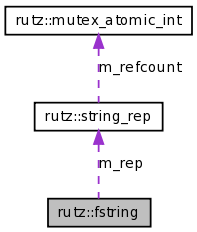rutz::fstring Class Reference
#include <rutz/fstring.h>
Collaboration diagram for rutz::fstring:

Public Member Functions | |
| fstring () | |
| Construct an empty string. | |
| fstring (const fstring &other) throw () | |
| Copy constructor. | |
| ~fstring () throw () | |
| Destructory. | |
| fstring (const char *s) | |
| Construct by copying from a C-style null-terminated char array. | |
| fstring (char_range r) | |
| Construct from a character range (pointer plus length). | |
| void | swap (fstring &other) throw () |
| Swap contents with another fstring object. | |
| fstring & | operator= (const char *text) |
| Assign from a C-style null-terminated char array. | |
| fstring & | operator= (const fstring &other) throw () |
| Assignment operator. | |
| const char * | c_str () const throw () |
| Get a pointer to the const underlying data array. | |
| std::size_t | length () const throw () |
| Get the number of characters in the string (NOT INCLUDING the null terminator). | |
| bool | is_empty () const throw () |
| Query whether the length of the string is 0. | |
| bool | empty () const throw () |
| Same as is_empty(); for compatibility with std::string interface. | |
| char | operator[] (unsigned int i) const |
| Return the character at position i. | |
| void | clear () |
| Reset to an empty string. | |
| bool | ends_with (const fstring &ext) const throw () |
| Query whether the terminal substring matches the given string. | |
| bool | equals (const char *other) const throw () |
| Query for equality with a C-style string. | |
| bool | equals (const fstring &other) const throw () |
| Query for equality with another fstring object. | |
| bool | operator< (const char *other) const throw () |
| Query if string is lexicographically less-than another string. | |
| template<class string_type> | |
| bool | operator< (const string_type &other) const throw () |
| Query if string is lexicographically less-than another string. | |
| bool | operator> (const char *other) const throw () |
| Query if string is lexicographically greater-than another string. | |
| template<class string_type> | |
| bool | operator> (const string_type &other) const throw () |
| Query if string is lexicographically greater-than another string. | |
| void | read (std::istream &is) |
| Set the string by reading consecutive non-whitespace characters. | |
| void | readsome (std::istream &is, unsigned int count) |
| Set the string by reading exactly count characters. | |
| void | write (std::ostream &os) const |
| Write the string's contents to the ostream. | |
| void | readline (std::istream &is, char eol= '\n') |
| Set the string by reading characters up until newline or EOF. | |
| bool | operator== (const char *rhs) const throw () |
| Equality operator. | |
| bool | operator== (const fstring &rhs) const throw () |
| Equality operator. | |
| bool | operator!= (const char *rhs) const throw () |
| Inequality operator. | |
| bool | operator!= (const fstring &rhs) const throw () |
| Inequality operator. | |
| void | debug_dump () const throw () |
| Dump contents for debugging. | |
Detailed Description
fstring is a simple string class that holds a pointer to a dynamically-allocated char array. The initializer does not have to reside in permanent storage, since a copy is made when the fstring is constructed. Assignment is allowed, with copy semantics. Also, a swap() operation is provided. The internal implementation uses reference counting to allow for efficient copies; however, to allow safe multi-threaded access to fstring, fstring's interface is read-only, except for a few functions (assignment operator, swap(), clear() read(), readline(), readsome()) which safely replace the entire string.
Definition at line 149 of file fstring.h.
The documentation for this class was generated from the following files:
- src/rutz/fstring.h
- src/rutz/fstring.cc